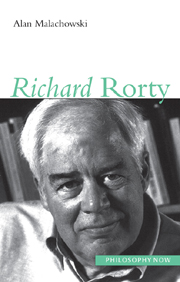7 - Rorty's legacy
Summary
A turn away from narration and utopian dreams toward philosophy seems to me a gesture of despair.
(Rorty 1999: 232)The trajectory of Rorty's own philosophical career may seem to have followed much the reverse direction. His first three books have been supplemented by a plethora of essays – most of them, it seems, now reprinted in four substantial volumes. To date, there are three consecutive collections of academic papers published by Cambridge University Press (ORT, EHO, TP) and an additional collection of more ‘occasional pieces’ published by Penguin under the title Philosophy and Social Hope (PSH; 1999). In these wide-ranging essays, Rorty elaborates on the kind of ‘post-pragmatist’ themes that emerged from Contingency, irony, and solidarity and continues to develop his interpretations – or ‘readings’ – of co-opted allies such as Davidson, Heidegger, Wittgenstein and Derrida. More often than not, he weaves the various results of these interpretations into further discussions of liberalism, where the emphasis usually shifts from its philosophical credentials to its utopian prospects: the various ways in which human beings might succeed in working together to build a better future. The essays also display an increased confidence in ‘literary’ ploys, especially in the forms of ‘strong textualism’ and narratives of ‘imaginative possibilities’.
The strong textualist's approach was first explicitly outlined in Rorty's paper “Nineteenth-Century Idealism and Twentieth-Century Textualism” (CP: Ch. 8):
The strong textualist simply asks himself the same question about a text which the engineer or the physicist asks himself about a puzzling physical object: how shall I describe this in order to get it to do what I want?[…]
- Type
- Chapter
- Information
- Richard Rorty , pp. 169 - 186Publisher: Acumen PublishingPrint publication year: 2001



